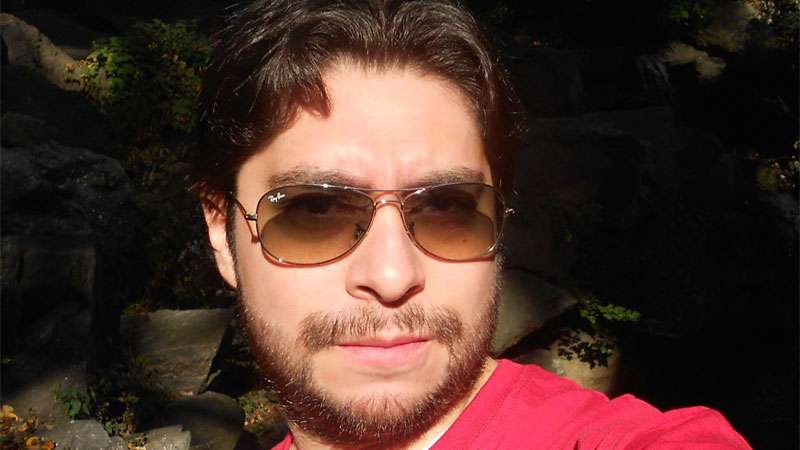
Our Contributor in México, Juan Tadeo.
Born in Mexico City in the 1980s, Juan Tadeo graduated from the National Autonomous University of Mexico (Universidad Nacional Autónoma de México) in 2009 with a law degree. On his blog, launched in August 2009, Juan exercises his right to freedom of expression, writing about topics ranging from justice, politics, and transparency to music and football.
A contributor to Global Voices since 2011, Juan's recent reporting has focused on the missing students from Ayotzinapa.
Global Voices (GV): How did you get involved with Global Voices?
Juan Tadeo (JT): It was almost four years ago, in early 2011, when I came looking for the former regional editor, Silvia Viñas. I learned a lot from her.
I learned about the existence of Global Voices few months before that, because one of the authors at the time cited my blog in a story about the violence, racism, and discrimination that exists at Mexico’s northern border, that is, the border with the United States. I was pleased to be quoted, and I was thrilled to see a fragment of my post translated into several languages within a few weeks.
GV: What do you like most about volunteering for GV?
JT: I find it fascinating to have the opportunity to collaborate with a platform that brings local stories to all corners of the world. At Global Voices, people can read about my country’s events in their own language (English, French, Italian, Esperanto, and many others). However, I like to create content in Spanish before it is translated. I do it because, in my opinion, it's not easy to find places outside the mainstream media that are impartial, reliable, and regularly updated, written in Spanish.
GV: What is the story that has impressed you the most and why?
JT: All stories of unpunished violence afflicting Mexico offend, move, and sadden me. Every time I write about missing people, or about the discovery of secret graves, or some other dire issue, I feel that [Mexico] slips further from the peace and justice that characterize much of the rest of the world. The history of the Cadereyta massacre and the grim facts of Ayotzinapa are particularly strong examples of this phenomenon.
Other stories of a completely different nature have also be hard for me, like writing in September 2014 about the death of Gustavo Cerati, a talented musician whom I admired for many years.
GV: What have you learned about citizen journalism?
JT: It's helped me to be more critical of mainstream journalism—to notice when such work is done poorly and to understand why.
In Mexico, this issue is particularly salient because the companies controlling the media offer the public a particularly shoddy product, evidently in order to favor the powerful, whom they ultimately represent.
Consequently, I have learned that many times (not always, unfortunately) the work done by citizen media is special and extremely valuable, even though most people, at least in Mexico, are yet to appreciate it.
GV: What should traditional media do in this new era of mass citizen participation and online social networks?
JT: I think they should pay attention to individuals who have become aware and demand quality and topical content. Some global media have begun to do so because they know the number of people demanding respect for their rights as viewers and consumers is increasing at a slow but steady pace.
In my country, that pace is slower than in most. A large section of the population is happy with the media's status quo, where the “news” focus is on rumors in the entertainment world, and broadcasting favors vulgar comedies and unsuccessful American films from the 1990s—a formula that has worked quite well for the big networks. There is a gradually growing number of people who turn off the TV, however. When consuming news, they check various sources—both local and global—before making their own judgments. It's these people who satisfy their thirst for information by turning to the interesting, alternative voices found in citizen journalism.







1 comment